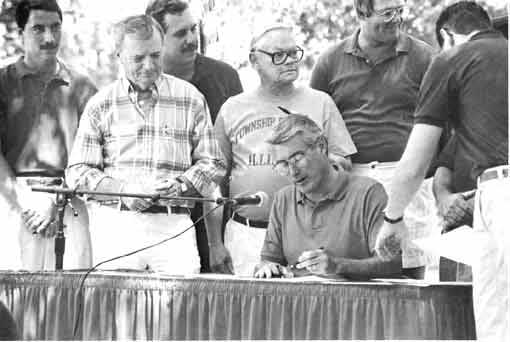|

EDGAR VETOES BILLS IMPOSING NEW MANDATES ON LOCAL GOVERNMENTS
Governor Jim Edgar used his veto pen to underscore his opposition to imposing new requirements on local governments without providing the funds to pay for them.
"I told the General Assembly and the people of Illinois in my State of the State address that we must call a halt to mandates on local governments mandates that have been a significant factor in driving up property taxes. I am following through on my commitment to oppose such mandates," the Governor said.
"State government costs have risen because of directives from the federal government. Local government costs have risen because of directions from state government. It is time to reverse that irresponsible trend for the sake of the taxpayers we all serve," Edgar said during Local Officials Day at the Illinois State Fair.
Edgar vetoed:
House Bill 50 and Senate Bill 25, both of which would have required local governments and private businesses to provide family leave benefits to employees.
House Bill 703, which would have imposed new, stringent requirements on local governments, as well as state government, in dealing with contractors and subcontractors on public works projects.
House Bill 179, which would have imposed new requirements on local governments by expanding the Prevailing Wage Act, which the Governor solidly supports in its current form.
The Governor also signed House Bills 875 and 1556, which would help local governments keep track of existing mandates and others that may become law.
September 1991 / Illinois Municipal Review / Page 5
In his veto message on House Bill 50 and Senate Bill 25, the Governor strongly endorsed the concept of family leave. "Working men and women should be free within reasonable limits to meet family responsibilities and obligations without fear of losing their jobs," he wrote.
He also pointed out he implemented parental leave for Secretary of State employees while he held that office and noted state employees under the Governor can avail themselves of a benefit known as "Family Responsibility Leave."
"I strongly believe such benefits should be included wherever possible in employee benefit packages, and I applaud those enlightened employers in our state who already provide such benefits.
"However, as I have indicated repeatedly, I do not believe government should dictate that employers provide family leave. The business community in Illinois believes the intervention by government could prove costly and would place many Illinois businesses at a disadvantage with their competitors in other states that do not have family leave laws.
"In addition, local government leaders have urged me not to approve still another mandate that takes decision-making out of their hands and sticks them and their taxpayers with the bill for greater costs," the
Governor said.
Added Edgar; "As a candidate for Governor, I was forthright about my views on this matter. And, even though I respect the right of proponents of this legislation to disagree with me, I strongly disagree that this boils down to a question of whether one is 'pro-family' or 'anti-family.'
"Of crucial importance to each and every family in this state is a healthy business climate. Of crucial
importance to each and every family in this state is whether we will stop the pattern of one level of government dictating policies to other levels of government without providing the money to fund those policies.
"In the mid-1970s, the Legislature and the Governor insisted upon approving employee benefits that made Illinois businesses less competitive and cost families in our state thousands of jobs. We have spent more than a decade trying to recover from those government excesses.
"For even longer, state government has imposed costly mandates on local governments winning
political plaudits for attractive programs and benefits but contributing to property tax increases at the local level."
Page 6 / Illinois Municipal Review / September 1991
In vetoing House Bill 703, Edgar said the legislation "represents a direct and harsh interference with the ability of governmental units to handle payment to contractors and subcontractors."
And, in vetoing House Bill 179, the Governor stressed his support for the current prevailing wage for state employees, state construction projects and local construction projects subject to the Prevailing Wage Act.
But he added, "This legislation would impose new mandates on local governments by requiring new
standards and regulations, and I oppose additional mandates on local governments."
The Governor also noted the legislation would have expanded the Prevailing Wage Act to local public and private development projects in enterprise zones and Tax Increment Financing (TIF) districts. That, he said, "would drive up the cost of construction in enterprise zones and TIF districts" and the higher costs could "serve only to discourage development in these economically depressed areas."
The two bills signed by the Governor are designed to help local governments keep abreast of existing mandates and any new mandates that make it into law in some fashion.
House Bill 1556 was sponsored by Sen. Martin J. Butler (R-Park Ridge) and Reps. Grace Mary Stern (D-Highland Park), Margaret Parcells (R-Northfield), Bill W. Balthis (R-Lansing), Geoffrey Obrzut (D-Northlake) and Manny Hoffman (R-Homewood).
It provides the failure of the General Assembly to appropriate adequate funds for reimbursement does not relieve the Department of Commerce and Community Affairs (DCCA) from its obligation to collect and maintain information under the State Mandates Act, including publication of a catalogue of state mandates.
House Bill 875 amends the State Mandates Act to require DCCA to report each year regarding proposed changes to the Act. The bill was sponsored by Sen. Penny Severns (D-Decatur) and Reps. William E. Peterson (R-Long Grove), Parcells, Balthis and Obrzut.
September 1991 / Illinois Municipal Review / Page 7
|